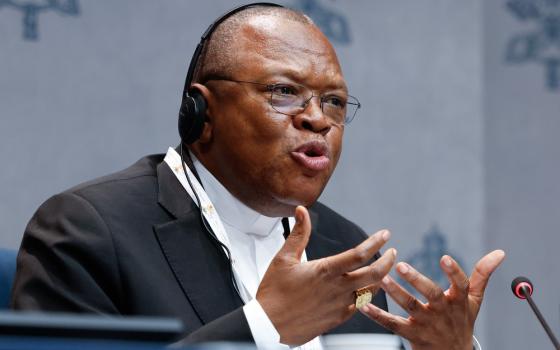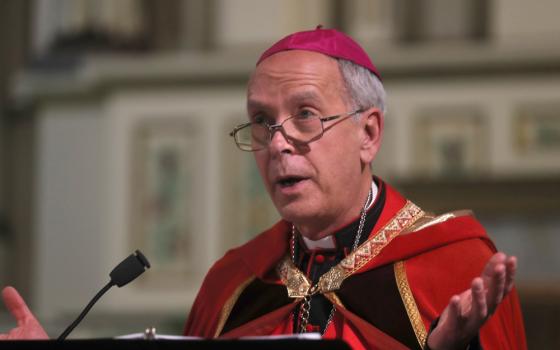In my Labor Day column for this year, I chided the U.S. Catholic bishops for two reasons: for failing to apply Catholic social teaching to the issue of justice in the Church itself and for failing to defend the right of workers to form labor unions and to engage in collective bargaining, especially in such states as Wisconsin, Ohio and elsewhere.
I always hear from one or two politically conservative readers in Wisconsin defending the initiatives of Gov. Scott Walker and the Republican legislature, but no one ever challenges me on connecting Catholic social teaching with the matter of justice in the church. Perhaps the principle of sacramentality, on which my argument is based, is too abstract for them.
The bishops did issue a Labor Day statement through their U.S. Bishops' Committee on Domestic Justice and Human Development chairman, Bishop Stephen E. Blair of Stockton, Calif., one of the best bishops in the conference.
Bishop Blair, like his predecessors, did not touch the connection between Catholic social teaching and justice in the church, but he did defend the right of workers to form unions in both the public and private sectors and to bargain collectively in each sector.
Bishop Blair pointed out that "Beginning in Rerum Novarum, the church has consistently supported efforts of workers to join together to defend their rights and protect their dignity. Pope Leo XIII taught that the right of workers to choose to join a union was based on a natural right and that it was the government's obligation to protect that right rather than undermine it (Rerum Novarum, 51)."
This teaching, Bishop Blair noted, has been affirmed consistently by Leo XIII's successors. Thus, Pope John Paul II, in his encyclical 1981 Laborem Exercens ("On Doing Work") declared that unions "are an indispensable element of social life, especially in modern industrial-ized societies (No. 20)."
More recently still, Pope Benedict XVI, in his 2009 encyclical Caritas in Veritate ("Charity in Truth"), insisted that "The repeated calls issued within the church's social doctrine, beginning with Rerum Novarum, for the promotion of workers' associations that can defend their rights must therefore be honored today even more than in the past" (No. 25).
Perhaps these papal teachings can be written off as naive, as one of my correspondents did in effect, but then papal teachings on human sexuality and reproduction can similarly be dismissed.
Bishop Blair stumbled, in good faith to be sure, when he insisted that "Bishops in Wisconsin, Ohio and elsewhere have faithfully and carefully outlined Catholic teaching on worker rights, suggesting that difficult times should not lead us to ignore the legitimate rights of workers."
Over against Walker and his supporters, Bishop Blair wrote that "the church affirms the rights of workers in public and private employment to choose to come together to form and join unions, to bargain collectively and to have an effective voice in the workplace" (my italics).
The bishops of Wisconsin, speaking through the archbishop of Milwaukee, Jerome Listeki, were never so specific as Bishop Blair has been. And I am not aware of any statement by the Ohio bishops that was critical of Gov. John Kasich and the Republican legislature, both of which denied collective bargaining rights to public service employees.
On the other hand, Bishop Blair's Labor Day statement is not completely one-sided in favor of labor unions. He makes clear that "This does not mean every outcome of bargaining is responsible or that all actions of particular unions — or for that matter employers — merit support. Unions, like other human institutions, can be misused or can abuse their role."
He even concedes that "unions in some places have taken public positions that the church cannot support, that many union members may not support and that have little to do with work or workers' rights." However, he does not give any examples.
At the same time, Bishop Blair continues, "The teaching that workers have the right to choose freely to form and belong to unions and other associations without interference or intimidation is strong and consistent."
This is a fine statement, even though it doesn't touch upon the principle of sacramentality and the church's obligation to practice what it preaches. Would that all the bishops in the conference could sign on to it, especially the parts that were highlighted in this week's column.
© 2011 Richard P. McBrien. All rights reserved. Fr. McBrien is the Crowley-O'Brien Professor of Theology at the University of Notre Dame.


